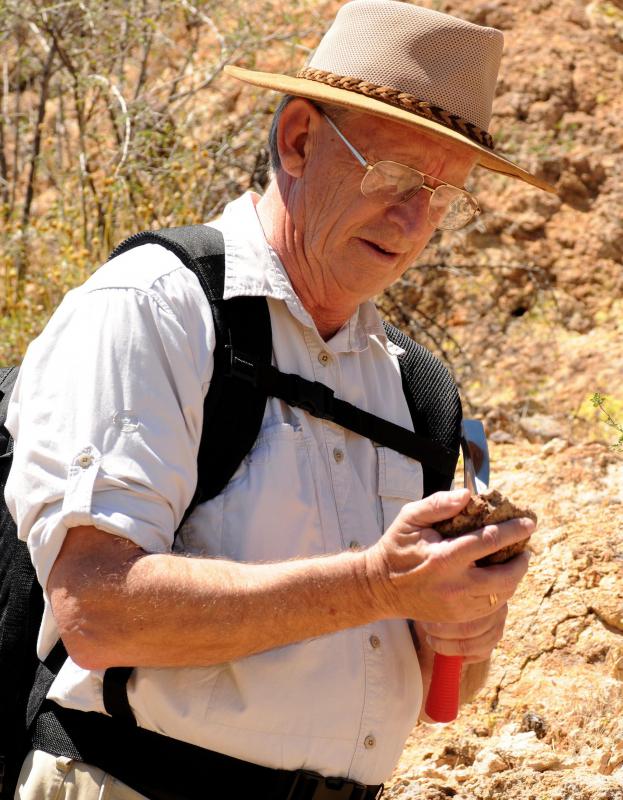At PracticalAdultInsights, we're committed to delivering accurate, trustworthy information. Our expert-authored content is rigorously fact-checked and sourced from credible authorities. Discover how we uphold the highest standards in providing you with reliable knowledge.
How Do I Become a Petroleum Geologist?
Becoming a petroleum geologist typically takes a combination of education, experience, and networking experience. The field is a broad and growing one, but getting the job you want usually takes a bit of planning. University education in geology, applied math, and engineering is typically essential. Though many schools offer these sorts of programs, some are better connected to the geological industry than others, and many of the major recruiters for petroleum geology jobs look for graduates at just a handful of schools. Knowing those schools and tailoring your resume before you so much as meet a recruiter can dramatically improve your chances of success. There are often a lot of possible job paths for people with petroleum geology expertise, and part of the struggle in getting started is figuring out whether you want to work in research, in the field, or in consulting. Having a strong network is often really important in this regard. Meeting people who are actively working can give you a different sense of the job than you could learn in a classroom, and contacts often refer candidates they know or have experience working with for specific jobs.
Understanding Petroleum Geology Generally

Petroleum geologists are involved in oil and natural gas exploration on land or in the ocean. The discipline generally is a broad one, and can include everything from detecting petroleum stores deep beneath the earth to building mines and coordinating the science of extraction. Refinement sometimes also comes within this sort of professional’s job duties, and research and the publication of scholarly articles is where some people focus, too. Those on the more theoretical side of the field may also work to negotiate international agreements for things like mining rights and needed safety precautions.
Importance of a Strong Undergraduate Program

An undergraduate degree is almost always essential in order to become a petroleum geologist, and the courses you take matter. Increasingly, the school also matters, particularly if you hope to work for one of the larger firms. Major oil companies tend to recruit job candidates only from a limited number of schools. As such, it’s often a good idea to gather some information on universities you’re considering before you enroll. Asking the geoscience advisor how graduates fare in the job market is a good place to start. Exercise caution if you don’t get a satisfactory answer, as the school’s contacts with industry may be weak. Consider enrolling in a program in an oil-producing region, and in a larger school. Although there are some exceptions, the larger schools are more likely to provide a greater depth of instructional resources.
Most of the time, your coursework should include studies in geophysics, structural geology, and geochemistry, as well as courses in basin modeling, sedimentology, and stratigraphy. Expertise in computer skills and mapping abilities can be important, too. Aside from required courses, studies in economics, statistics, and oil property evaluation will also be helpful. Auditing courses in petroleum or reservoir engineering can also be advantageous.
Consider Graduate-Level Studies
Continuing on to earn a master’s or doctorate degree is often recommended, too. In-depth studies will give you more expertise, which can make you much more valuable as a new hire. Many schools offer programs dedicated to aspects petroleum geology, and talking with an advisor or professor in these programs can help you determine if enrollment might make sense for you.
Work to Build a Strong Network
Those who want to become a petroleum geologist should make as many contacts as possible with professionals in the field. Contacts play a key role not only in finding employment, but in advancing in your company or career as well. Joining professional organizations and attending meetings and conventions as often as you can will give you an extra edge in the industry and help you to stay up-to-date on the latest technology and developments in the industry.
Needed Personal Qualities
A number of personal attributes, skills, and qualities can also help prepare you for success. A good physical constitution and stamina are necessary to cope with the rigors of fieldwork, for instance. Perseverance is an advantage, because the task of locating a particular deposit can require a great deal of time and effort. Keen observation and communication skills are also important so that you can collect and interpret data on the field and convey your findings to other scientists and professionals. As many jobs necessitate international travel, proficiency in a second language can be an advantage, too.
AS FEATURED ON:
AS FEATURED ON:












Discuss this Article
Post your comments